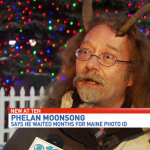About a month ago, Jason Mankey wondered whether the controversies in the Pagan blogosphere have anything to do with Paganism “closer to home” in a post entitled, “Outside Looking In (or Is Anybody Really Listening?)”. Due to the holidays and family crises, I haven’t gotten around to discussing it. But since it hits close to home, I wanted to comment. The two examples Jason gave were the “embarrassment in/of the Greater Pagan Community” issue, which started with a post by Teo Bishop and I discussed in multiple posts here, and the cis-gendered women issue which arose at Panetheacon last year. In the former case, Jason concluded that the “conversation seemed to exist only in the blogosphere”.
First of all, I honestly don’t know how anyone could make that statement. While I do not doubt that Jason is more involved in the “flesh and blood” Pagan community than your average Pagan blogger, he simply could not know what real effects that online conversation was spawning beyond his own circle.
Second, while I agree that controversy on the Internet can sometimes have little reference to real life, I don’t think that the two examples Jason gave really proved his point. The “embarrassment issue” started with Teo’s experience at a Pagan Pride event (and my own response arose out of my own experiences at Pagan Pride), and the cis-gendered issue arose at a ritual at Pantheacon, where Jason himself was attending. I don’t know how much more real Pagan community gets that Pagan Pride and Pantheacon. Just because Jason did not attend the women-only ritual where the cis-gender protest occurred does not mean that it was not happening for real in the Pagan community. And just because the ritual which Teo attended happened at a different Pagan Pride event than wherever Jason happened to be attending does not mean that the issues that ritual raised were not reflected in “Greater Pagandom”.
If you want to argue that “real” Pagan community occurs only in small covens, groves, etc., I think that case can be made, but the fact that your small circle (or somewhat larger circle, in Jason’s case) is unaware of issues being discussed by the online community is not indicative of anything but the disconnectedness of your own group. And you may argue that “real” Paganism cannot happen on the Internet, and can only happen in the “flesh and blood”, and I would probably agree with you. But that does not mean that the issues which are discussed on the Internet did not arise out of a flesh and blood experiences.
The number of responses that both of these issues generated (not to mention the emotion expressed in many of the responses) suggests that they are real issues in the broader Pagan community. While some of us bloggers are more “armchair Pagans”, for whom the online community is our primary community, does that make our community somehow unreal? Unless you live in the Bay Area in California (as Jason does — I’m jealous), chances are that your opportunities for live-Pagan contact will only occur between 8 and 13 times year, plus Pagan Pride Day (if you live near a major metropolitan area) and any festivals or conventions that you can afford to travel to. I love Jason’s writing and speaking, but I think this one post was maybe reflective of a certain Bay-Area-centrism. There are other hubs of Paganism, and the Pagan community is spread all over the U.S. and the world, for that matter.
My point? While the Pagan blogosphere is not the entire Pagan community by any stretch, it is part of the Pagan community. And while there are “controversies” online that really boil down to nothing more than PC-phrasing, in general the issues discussed online are as real and significant to the future of Paganism as those in any small coven — and arguably more so, because the online community is larger and more connected.
I was glad to see “dashifen” respond to Jason’s post:
“[…] the online Pagan community IS my community and I embrace it, foibles and all, as an intricate and important part of my life and I suspect there are others out there who feel the same.”
I am one of those who does feel the same.
To be fair, Jason went on to clarify, in response to “dashifen” that he was not questioning whether online Pagan communities were real communities, but rather how broad of a cross-section of the Pagan community the online community represents. Are we influencing the “Greater Pagandom”, or just talking to ourselves? Those are valid and important questions. But behind Jason’s question seems to be the assumption that issues discussed online arise online and then have to “trickle down” to the “flesh and blood” community. And that just is not the case, generally. The two examples Jason gave prove this point. Pagan bloggers, including Jason, are writing about their (offline) experience of Paganism. The discussion themselves may or may not “trickle down” to those less connected Pagans, but that does not mean that those Pagans are not having the same or similar experiences which gave rise to the online discussion on the first place. And from where I am sitting (my armchair), those who do not participate in some form of broader connectedness (whether it be the Internet, Pagan publications, or pan-Pagan events like Pagan Pride) are missing out on the opportunity to shape the course of the future of Paganism.















